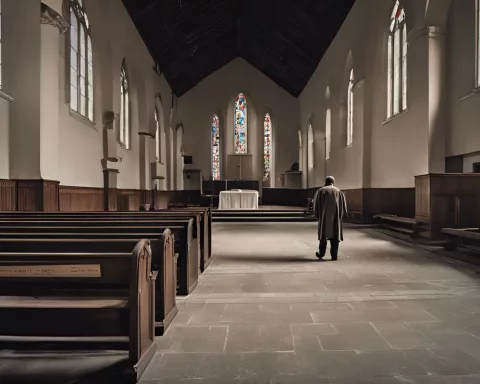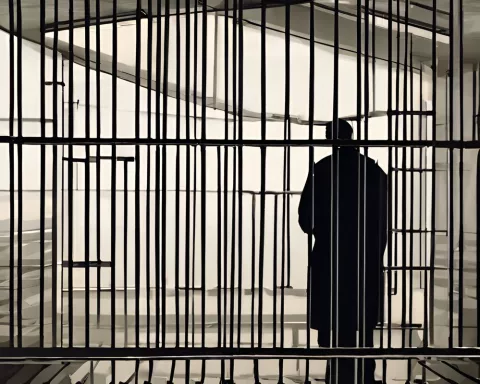Oscar Pistorius, once a celebrated Paralympic star, faced a tragic downfall when he was convicted of murder. He now lives in his uncle’s home in South Africa, devoting time to spirituality and volunteering as a caretaker at a church. Despite his restrictions and past mistakes, Pistorius’ journey showcases human resilience, transformation, and repentance.
Who is Oscar Pistorius and what is his journey?
Oscar Pistorius is a former Paralympic star who participated in the Olympics and won six gold medals in the Paralympics. However, his legacy suffered a devastating blow when he was convicted of the murder of Reeva Steenkamp. He now lives in his uncle’s home, where he volunteers as a caretaker at a church in South Africa, devoting his time to spirituality. Despite his turbulent past, Pistorius’ current journey presents an intriguing exploration of human resilience, transformation, and repentance.
From Glory to Disgrace
Oscar Pistorius, fondly known as the Blade Runner, embodies a paradoxical blend of victory and downfall. His journey, from the exhilarating heights of Paralympic gold and participation in the Olympics, to the disgrace of a murder conviction, encapsulates an extraordinary life. Today, Pistorius is traversing a distinctly different path, far removed from the glitz and glamour that once defined his existence.
The former Paralympic star now basks in the tranquility of spirituality, devoting his time to the NG Kerk Waterkloof in Pretoria, South Africa. His association with this church commenced following his release from prison and as a part of his community service. The church compound, which he once declared as his workplace in his parole papers, is now the place where he volunteers as a caretaker, subtly remaining behind the scenes, tackling the unassuming tasks of minor maintenance and janitorial duties.
Spiritual Awakening in the Midst of Hardship
During his incarceration, Pistorius found solace and anchorage in spirituality. Over the course of eight years, he conducted Bible studies and prayer gatherings, manifesting a growing depth in his faith. Presently, he continues to cultivate his spiritual life, faithfully attending services at NG Kerk Waterkloof, an expansive family church that embraced him into their congregation, largely due to the influence of his uncle.
However, his past continues to cast a dark shadow. From the unprecedented success of being the first limbless athlete to compete in the Olympics and winning six gold medals in the Paralympics, Pistorius’ reputation suffered a devastating blow. A murder conviction and a thirteen-year prison sentence for the fatal shooting of Reeva Steenkamp irreversibly blemished his legacy. Pistorius’ defense, that he mistook Steenkamp for a burglar and reacted in fear, failed to alleviate the severity of his offence.
Redemption and Restrictions
His parole, granted earlier this year, came with rigorous conditions, binding him to a regulated lifestyle. Pistorius is ordered to comply with specific curfew hours, abstain from alcohol and illegal substances, and engage in therapy sessions to address anger management and gender-based violence issues. With a watchful official assigned to monitor any changes in Pistorius’ professional or personal life, his freedom is far from absolute.
Pistorius now lives in his uncle Arnold’s lavish Waterkloof home, specifically in a charming garden cottage within the pristine estate. His parole conditions, set to last until the end of his sentence in 2029, limit his communication with the external world. He is prohibited from writing a memoir or conducting interviews, effectively silencing his narration and shrouding his post-release life in ambiguity.
Another layer to his restrictions is the prohibition on any interaction with the Steenkamps, a continuous memento of the irreparable harm his actions inflicted. The demise of Barry Steenkamp, Reeva’s father, at 80 last year, ten years after Pistorius murdered his daughter, imparts a sorrowful epilogue to this tragic story.
Moving Forward: A Study of Human Resilience
Despite his turbulent past, Pistorius’ current journey presents an intriguing exploration of human resilience, transformation, and repentance. His shift from the adrenaline-charged atmosphere of the Olympics to the tranquil rhythm of church caretaking narrates a tale of striking contrasts. It bears witness to a life that continues to evolve and adapt, even under the burdens of unimaginable transgressions. It is a tale that continues to unfurl, one day at a time, in the tranquility of a Pretoria church.
What led to Oscar Pistorius’ downfall?
Oscar Pistorius’ downfall was caused by his murder conviction for the shooting of Reeva Steenkamp. Despite his defense that he mistook her for a burglar and reacted in fear, he was found guilty of murder and sentenced to thirteen years in prison.
What is Oscar Pistorius doing now?
Oscar Pistorius now lives in his uncle’s home in South Africa, where he volunteers as a caretaker at NG Kerk Waterkloof in Pretoria and devotes his time to spirituality. He is bound by strict parole conditions, including compliance with curfew hours, abstaining from alcohol and illegal substances, and therapy sessions to address anger management and gender-based violence issues.
What are the restrictions on Oscar Pistorius?
Oscar Pistorius is prohibited from writing a memoir or conducting interviews, and he is not allowed to have any interaction with the Steenkamps. His parole conditions limit his communication with the external world and are set to last until the end of his sentence in 2029.
How has spirituality helped Oscar Pistorius?
Oscar Pistorius found solace and anchorage in spirituality during his incarceration, cultivating his faith through Bible studies and prayer gatherings. He continues to attend services at NG Kerk Waterkloof, where he is embraced by the congregation and devotes his time as a caretaker.
What is the significance of Oscar Pistorius’ journey?
Oscar Pistorius’ journey showcases human resilience, transformation, and repentance. Despite his turbulent past, he has adapted to a new life and found purpose in the tranquility of a Pretoria church. His story continues to unfold, one day at a time.
What is the future for Oscar Pistorius?
The future for Oscar Pistorius is uncertain, as he is bound by strict parole conditions and prohibited from certain activities. However, his journey serves as a testament to the resilience of the human spirit, and his transformation and repentance provide hope for those seeking redemption.












